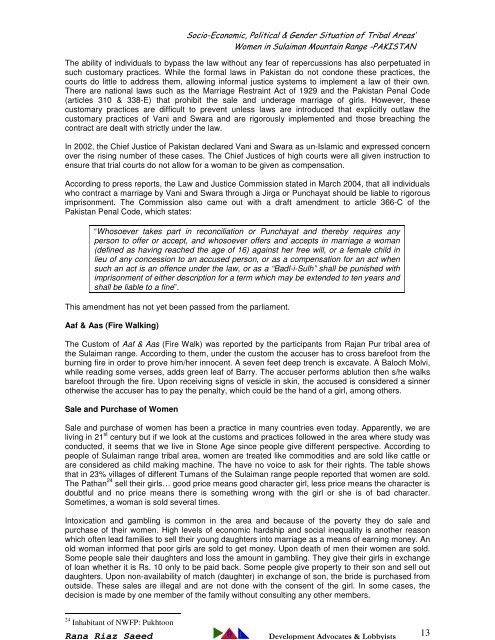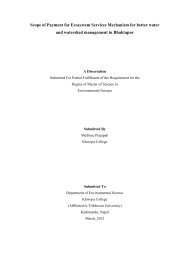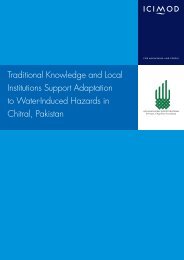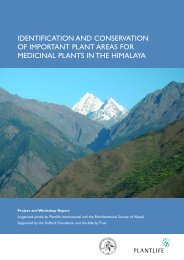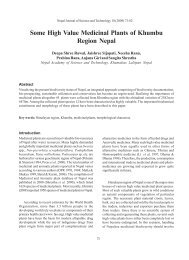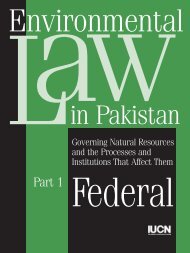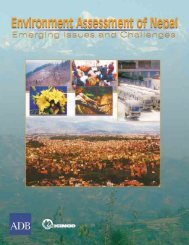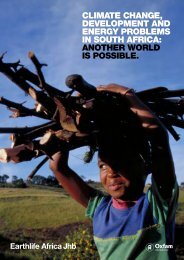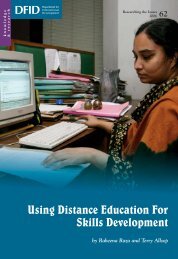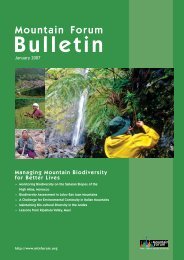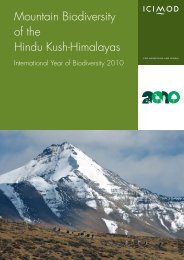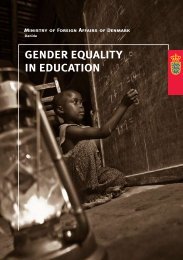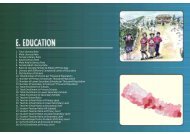Rana Riaz Saeed 1 - ResearchGate
Rana Riaz Saeed 1 - ResearchGate
Rana Riaz Saeed 1 - ResearchGate
Create successful ePaper yourself
Turn your PDF publications into a flip-book with our unique Google optimized e-Paper software.
Socio-Economic, Political & Gender Situation of Tribal Areas’<br />
Women in Sulaiman Mountain Range -PAKISTAN<br />
The ability of individuals to bypass the law without any fear of repercussions has also perpetuated in<br />
such customary practices. While the formal laws in Pakistan do not condone these practices, the<br />
courts do little to address them, allowing informal justice systems to implement a law of their own.<br />
There are national laws such as the Marriage Restraint Act of 1929 and the Pakistan Penal Code<br />
(articles 310 & 338-E) that prohibit the sale and underage marriage of girls. However, these<br />
customary practices are difficult to prevent unless laws are introduced that explicitly outlaw the<br />
customary practices of Vani and Swara and are rigorously implemented and those breaching the<br />
contract are dealt with strictly under the law.<br />
In 2002, the Chief Justice of Pakistan declared Vani and Swara as un-Islamic and expressed concern<br />
over the rising number of these cases. The Chief Justices of high courts were all given instruction to<br />
ensure that trial courts do not allow for a woman to be given as compensation.<br />
According to press reports, the Law and Justice Commission stated in March 2004, that all individuals<br />
who contract a marriage by Vani and Swara through a Jirga or Punchayat should be liable to rigorous<br />
imprisonment. The Commission also came out with a draft amendment to article 366-C of the<br />
Pakistan Penal Code, which states:<br />
“Whosoever takes part in reconciliation or Punchayat and thereby requires any<br />
person to offer or accept, and whosoever offers and accepts in marriage a woman<br />
(defined as having reached the age of 16) against her free will, or a female child in<br />
lieu of any concession to an accused person, or as a compensation for an act when<br />
such an act is an offence under the law, or as a “Badl-i-Sulh” shall be punished with<br />
imprisonment of either description for a term which may be extended to ten years and<br />
shall be liable to a fine”.<br />
This amendment has not yet been passed from the parliament.<br />
Aaf & Aas (Fire Walking)<br />
The Custom of Aaf & Aas (Fire Walk) was reported by the participants from Rajan Pur tribal area of<br />
the Sulaiman range. According to them, under the custom the accuser has to cross barefoot from the<br />
burning fire in order to prove him/her innocent. A seven feet deep trench is excavate. A Baloch Molvi,<br />
while reading some verses, adds green leaf of Barry. The accuser performs ablution then s/he walks<br />
barefoot through the fire. Upon receiving signs of vesicle in skin, the accused is considered a sinner<br />
otherwise the accuser has to pay the penalty, which could be the hand of a girl, among others.<br />
Sale and Purchase of Women<br />
Sale and purchase of women has been a practice in many countries even today. Apparently, we are<br />
living in 21 st century but if we look at the customs and practices followed in the area where study was<br />
conducted, it seems that we live in Stone Age since people give different perspective. According to<br />
people of Sulaiman range tribal area, women are treated like commodities and are sold like cattle or<br />
are considered as child making machine. The have no voice to ask for their rights. The table shows<br />
that in 23% villages of different Tumans of the Sulaiman range people reported that women are sold.<br />
The Pathan 24 sell their girls… good price means good character girl, less price means the character is<br />
doubtful and no price means there is something wrong with the girl or she is of bad character.<br />
Sometimes, a woman is sold several times.<br />
Intoxication and gambling is common in the area and because of the poverty they do sale and<br />
purchase of their women. High levels of economic hardship and social inequality is another reason<br />
which often lead families to sell their young daughters into marriage as a means of earning money. An<br />
old woman informed that poor girls are sold to get money. Upon death of men their women are sold.<br />
Some people sale their daughters and loss the amount in gambling. They give their girls in exchange<br />
of loan whether it is Rs. 10 only to be paid back. Some people give property to their son and sell out<br />
daughters. Upon non-availability of match (daughter) in exchange of son, the bride is purchased from<br />
outside. These sales are illegal and are not done with the consent of the girl. In some cases, the<br />
decision is made by one member of the family without consulting any other members.<br />
24 Inhabitant of NWFP: Pukhtoon<br />
<strong>Rana</strong> <strong>Riaz</strong> <strong>Saeed</strong> Development Advocates & Lobbyists 13


